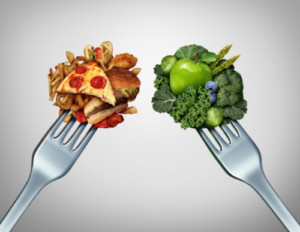Macronutrient 2: Carbohydrate
If you’re trying to get ripped like Brad Pitt in Fight Club or toned like Gisele Bündchen from Victoria’s Secret then the word “carbs” probably isn’t in your vocabulary. “Carbs”, aka carbohydrates, have received a bad rap in the health and fitness industry as many people think that they are the culprits of weight gain. Nowadays, it seems to be common knowledge to avoid those pesky carbs to lose the extra pounds.
Maybe one of the reasons that carbohydrates have received such a terrible reputation is that people don’t understand what they are or how the body utilizes them. So in order to give carbohydrates a fighting chance in today’s society, I’ve decided to tell the world their story.
What is a carbohydrate?
Let me guess, you’re thinking potatoes, rice, bread or pasta? I am not a mind reader, but 9 times out of 10 those are the answers I hear from clients. To their credit, they aren’t wrong but there is a lot more to carbohydrates than people think.
To get to the nitty gritty of it, carbohydrates are the primary source of immediate energy used by the body. They are what the body prefers to use when it is in desperate need of energy. Scientifically speaking, there are two types of carbohydrates: monosaccharides (aka simple sugars/carbs) and polysaccharides (aka complex carbs or starches). Monosaccharides are the simplest form of carbohydrates and cannot be broken down any further. Polysaccharides are groups of simple carbohydrates put together, and eventually get broken down to monosaccharides by the body.
The most commonly known monosaccharides is “glucose” which is used by the body to fuel your daily activities. From your brain and nervous system to your muscles used while exercising, the body prefers to use glucose. As a result, the body benefits when glucose is readily available and has a continuous supply of it. Think of carbohydrates as gasoline in your car, it is what fires up the engine and keeps it running. Carbohydrates are essential for life, so you can’t avoid them!
Types of carbohydrates
The word “carbs” has socially been linked with high processed and high sugar foods such as bread, pasta, white rice, white potatoes, cereals and candy. These highly processed carbohydrates have a shelf life that can outlast Marvel’s Wolverine and are absorbed by the body very fast. Because of the fast digestion rate and awful amounts of sugars in these processed foods, we see an increase in blood sugar levels, blood triglyceride levels, cholesterol levels and insulin resistance. All these factors are known to lead to chronic diseases such as diabetes and coronary heart disease. Furthermore, since these refined carbohydrates get digested so quickly and are very calorie dense, it leads to a higher daily calorie intake leading to weight gain.
Since society has done a terrible job categorizing carbs, let’s explore a little deeper into what other carbohydrates are out there. If you aren’t familiar with the glycemic index (GI), learn it. The GI is a measure of how quickly a given food can raise one’s blood sugar levels. Since table sugar is the most sugary substance and raises blood sugar levels the fastest, it has the top score of 100. All other foods are then scored relative to 100. Essentially, the lower the food is on the scale out of 100, the less it will raise your blood sugar levels. Why are high sugar levels bad? Well, high blood sugar levels means high insulin levels. Eventually your body will become insulin resistant and voilà, diabetes is born.
So, what are sources of carbohydrates that will not spike up blood sugar levels? Vegetables, legumes, and fruits should be your go to carbohydrate source. Yes folks! I said veggies and fruits. The majority of individuals don’t realize that vegetables, legumes and fruits have enough carbohydrates to fuel our daily activities. Unprocessed whole grains are also an excellent option for good carbohydrate sources and make it easier to adjust from that traditional “North American diet”.
These “healthy carbohydrates” are low on the glycemic index chart and are much more nutrient dense then processed carbohydrates. The benefits of replacing your carbohydrate intake with vegetables, legumes and fruits are enormous. They will help you reach your vitamin and mineral needs, increase your fiber intake, increase your body’s thermic effect and control your blood sugar levels. Because of the slower digestion rate, you will also feel fuller for longer periods of time, leading to a lower daily calorie intake.
How much carbohydrates?
There are a lot of factors that may influence the amount of carbohydrates an individual needs. For starters, the amount of carbohydrate will depend on your body size and activity levels. Individuals who are bigger or more active will need more carbohydrates while the individuals that are sedentary or smaller will need less. Secondly, carbohydrate intake may also depend on one’s goals and intake of other macronutrients (proteins and fats).
Needless to say, the minimum recommended carbohydrate intake is 130 grams per day. In most cases, people consuming high processed foods are far beyond the minimum recommendation. To put into perspective, one slice of bread has on average 15 grams of carbohydrates while one spear of broccoli has 2 grams of carbohydrates, so it isn’t too difficult to for individuals to reach that recommendation. Passing the minimum recommendation may not be an issue since we inevitably want to avoid deficiencies. However, the problem lies in that people are also exceeding the amount of carbohydrates necessary to fuel their daily activities. In other words, the extra carbs being consumed that are not burned, are stored as fat and are unnecessarily elevating blood sugar and insulin levels.
In order to keep you keep your sanity and not have you counting each and every carbohydrate you consume, let’s simplify it. Cut back on high processed carbs (breakfast cereals, breads, pasta, white potatoes, and rice) and replace them with high quality carbs (broccoli, cauliflower, quinoa, steel cut oats, bell peppers…). Trust me, you won’t die of starvation by replacing these foods and there’s a good chance you were eating too many carbohydrates to begin with, therefore you won’t be deficient either. Don’t get obsessed with counting carbohydrates, that’s not the point, just make sure you’re consuming lots of vegetables, legumes and fruits and you’ll be just fine. After all, I’ve never heard of anyone getting obese because they ate too many vegetables ;).
Carbohydrate examples:
Click the link bellow to download a table of different types of carbohydrates.
So stop being so stubborn with your old ways and ditch the notion that you need bread, cereal, potatoes and rice at every meal. Replace your processed carbs with vegetables, legumes, and fruits and you’re body will thank you for it. The next stop on our nutritional knowledge quest is the all mighty Fats! Are they essential for a healthy lifestyle or are they indeed creating those nasty love handles?
P.S. If you’re still confused or wanting help on any of the topics covered in the nutrition 101 series, feel free to contact me via email at paul@purewinnipeg.com
Cheers,
Paul Bissonnette B. Kin, CEP, CSCS, FMSC, Pn1
References
- Andrews, R. (n.d.). All About Carbohydrates: how carbs affect your health and performance. Retrieved from Precision Nutrition: http://www.precisionnutrition.com/all-about-carbohydrates
- Baechle, T. R. ; Earle, R. W. & National Strength and Conditioning Association. (200). Essentials of strength training and conditioning (3rd ed.). Champaign, IL: Human Kinetics.
- Berardi, J., & Andrews, R. (2015). The Essentials of Sport and Exercise Nutrition Certification Manual (Second ed.). Precision Nutrition Inc.
- Gross, L., Li, L., Ford, E., & Liu, S. (2004). Increased consumption of refined carbohydrates and the epidemic. American Society of Clinical Nutrition(79), 774-779.
- McArdle, W., Katch, F., & Katch, V. (2010). Exercise Physiology: Nutrition, Energy, and Human Performance (7 ed.). Philadelphia: Wolters Kluwer: Lippincott Williams & Wilkins.
- Poliquin Group Editorial Staff. (2015, May 20). Five signs you are eating too many carbs. Retrieved from Poliquin Group: http://main.poliquingroup.com/ArticlesMultimedia/Articles/Article/1323/Five_Signs_You_Are_Eating_Too_Many_Carbs_
- Szabo de Edelenyi, F., Julia, C., Courtois, F., Méjean, C., Péneau, S., Galan, P., . . . Kesse-Guyot, E. (2014). Starchy food consumption in French adults: a cross-sectional analysis of the profile of consumers and contribution to nutritional intake in a web-based prospective cohort. Annals of Nutrition & Metabolism, 64(1), 28-37.
- Wylie-Rosett, J., Segal-Isaacson, C., & Segal-Isaacson, A. (2004). Carbohydrates and Increases in Obesity: Does the Type of Carbohydrate Make a Difference? Obesity Research, 12, 124-129.







